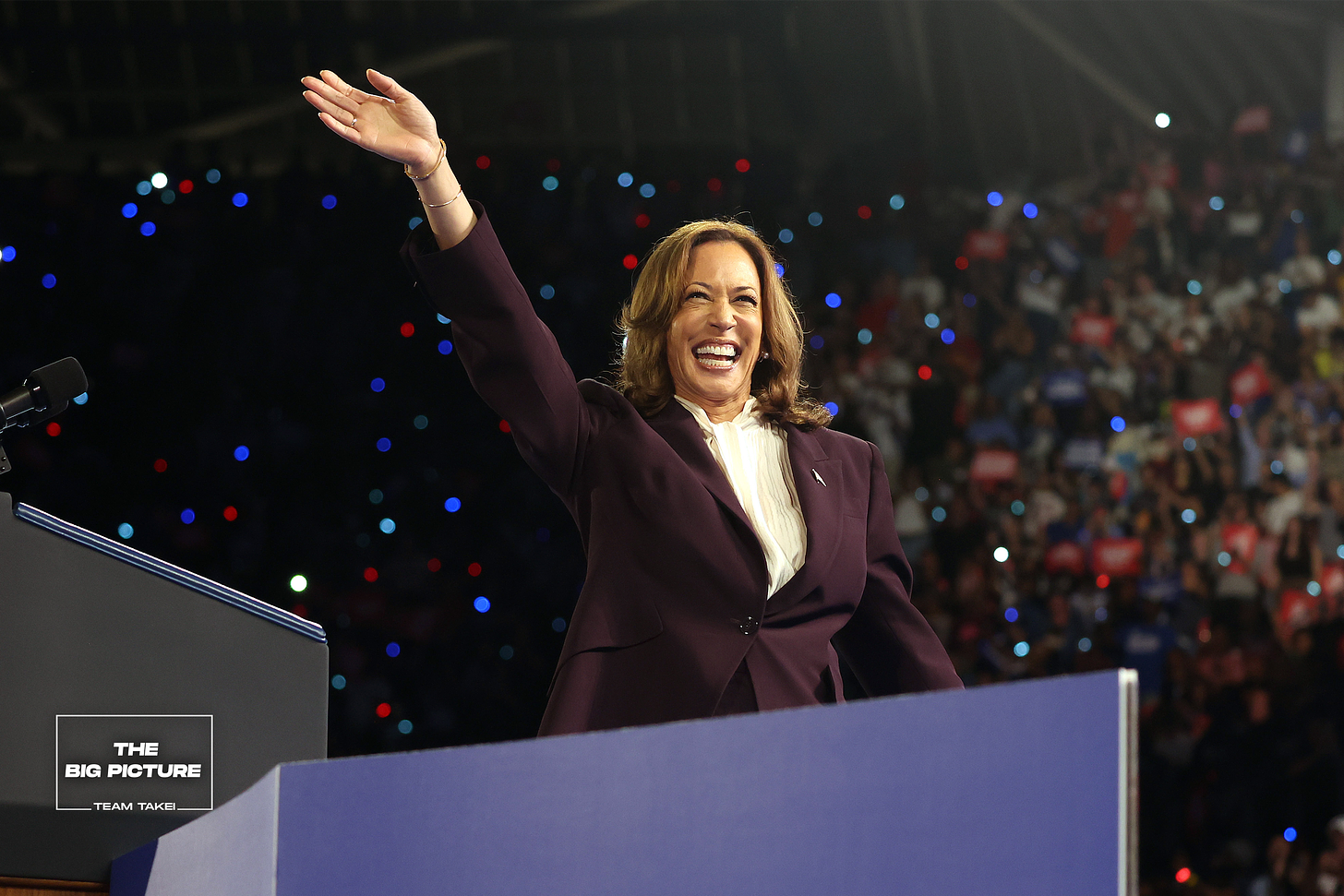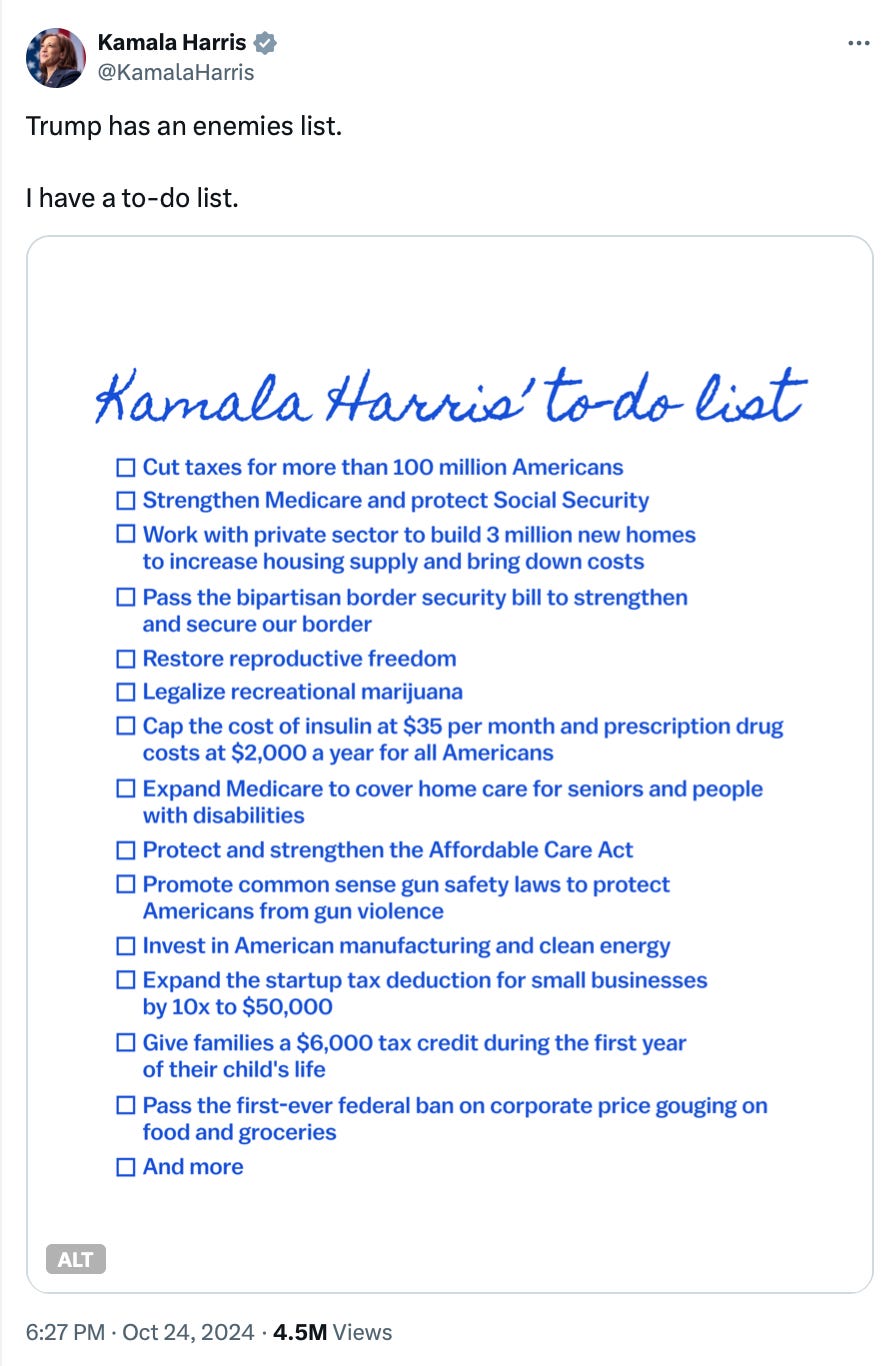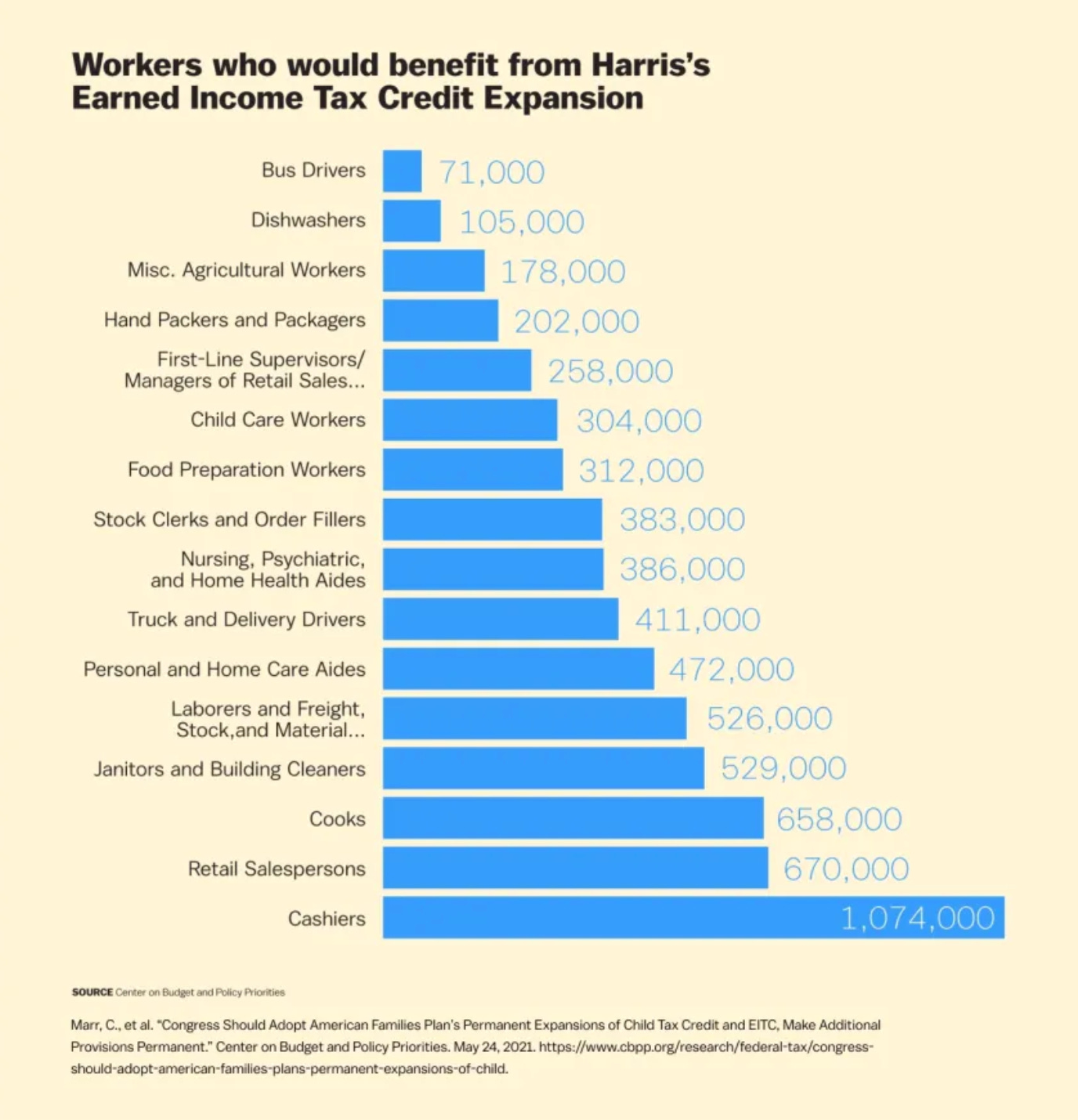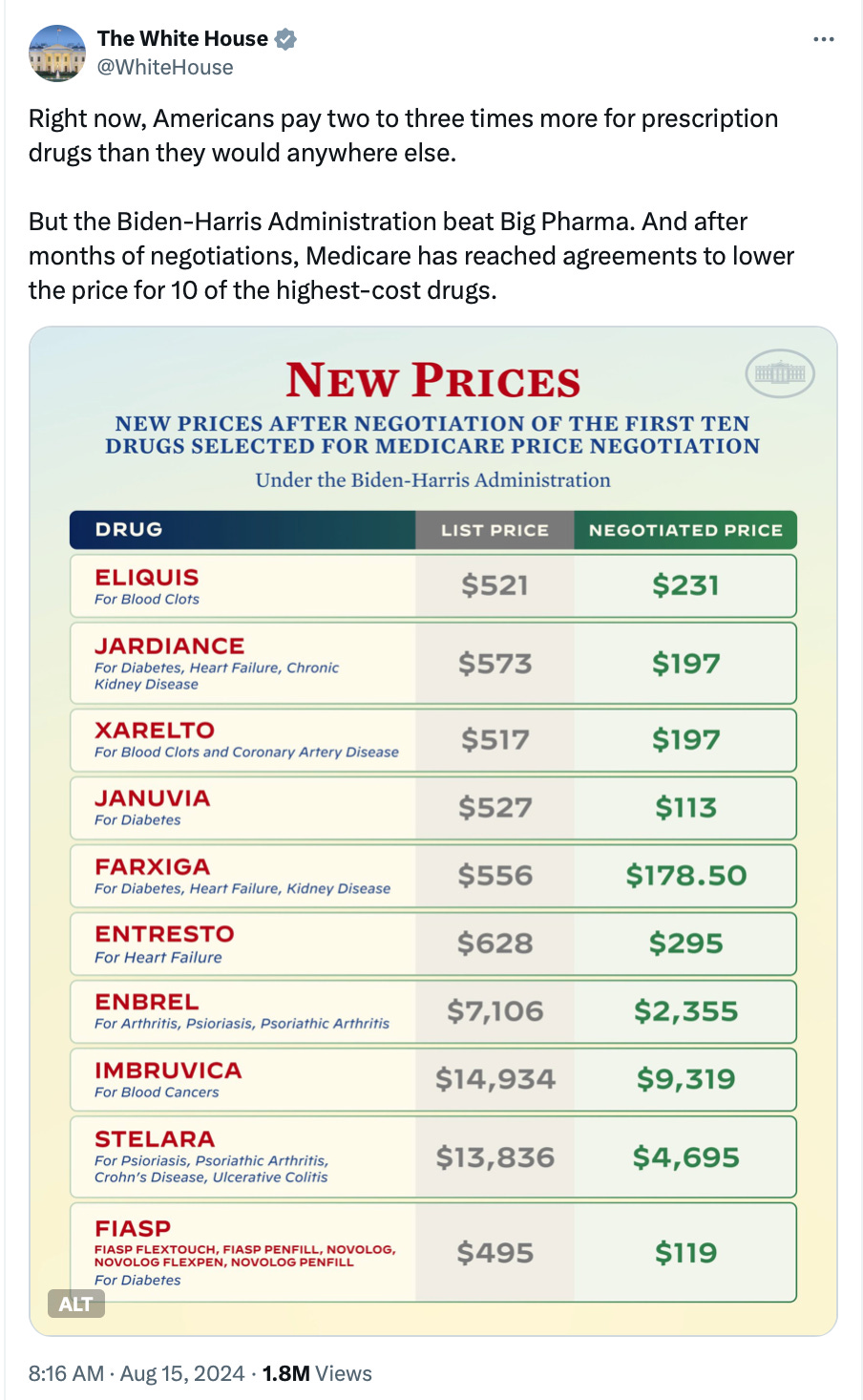The Promise Of A Kamala Harris Presidency
What the first term agenda of President Kamala Harris would look like.

One week out from Election Day and just hours ahead of VP Kamala Harris’s closing argument speech at the Ellipse in Washington, DC, as Democrats across the country obsessively refresh election forecasts and scour social media for that one unambiguous sign of an impending Harris victory, we thought instead of another analysis of the election horserace, we would focus on what is really at stake in this election.
We all know that a Harris victory would be a win for democracy, decency, and the rule of law. But it would also mean a doubling down on the progress Democrats have made in the last four years with real policies that would impact people’s lives and potentially change the course of our nation.
And contrary to the claims of many, we have a whole lot of policy to go on when analyzing what a Kamala Harris presidency would look like.
Take the recent release of her presidential “To-Do List,” which Harris has masterfully contrasted with Donald Trump’s “enemies list.”
If we know one thing about Kamala Harris, it’s that she wants to get right to work making progress for the American people. And this list does an excellent job of distilling what her goals for her presidency would be:
In today’s piece, I’ll dig into what some of these policies would mean in real terms. It’s a reminder that our vote is not just against an authoritarian con man hellbent on using the presidency to exact retribution. Our vote is for progress, it’s for opportunity, and it’s for moving the country forward with compassion.
Restoring Reproductive Freedom
Among Kamala Harris’s top priorities as President is restoring reproductive freedom, which ended as a federal right when the Supreme Court, stacked with anti-choice justices appointed by Donald Trump, overturned Roe v. Wade in 2022.
Ever since then, abortion politics have driven turnout among majorities in red and blue states alike as statewide initiatives have sought to restore protections gutted by the Court’s Dobbs decision. On November 5th, 10 states have measures on the ballot to restore at least some of the protections of Roe at the state level, but Kamala Harris would like to take that national.
Harris has both pledged to sign a bill passed by Congress that restores the protections of Roe, and signaled support for doing away with the filibuster on the matter to get past the 60 vote threshold in the U.S. Senate. But it is an open question whether Congress would be able to restore the protections with simple legislation.
Back in 2021, the House passed the Women’s Health Protection Act to protect the federal right to abortion care, and it could very well do so again if the Democrats retake the House. But according to Slate, there is both reason to believe it would be overturned by the Supreme Court and that there is actually some risk to its passage.
Still, as Naomi Cahn, Alan Morrisson, and Sonia Suter write in Ms. Magazine, there is much Congress can do in the interest of protecting reproductive freedom:
“Congress could amend existing federal laws to provide economic assistance for abortion. For example, it could repeal the Hyde Amendment, which is an annual restriction passed in 1976 that prohibits federal money from being used to fund abortions, except when necessary to save the life of a pregnant person or when a pregnancy is the result of rape or incest.”
“Congress could enact legislation that protects the right to interstate travel for an abortion. Congress could also make it a federal offense for anyone, including state prosecutors, to interfere with that right.”
“Harris could ask Congress to pass a law that would guarantee the same kind of access to mifepristone that the FDA currently allows.”
“Congress could also ensure that mailing abortion pills is legal. It could do so by not only repealing a Victorian law called the Comstock Act, which some judges have interpreted as prohibiting the mailing of abortion pills, but also directly declaring that such acts are legal.”
Of course, these laws would also be subject to review by the Supreme Court, which is famously hostile to these policies. That could mean that the biggest impact Harris might have on abortion rights during her presidency lies in the Supreme Court Justices she gets to appoint. A Court with more liberal justices on it could begin to chip away at the wall the anti-choice conservatives have built around abortion rights. And a new liberal majority might even undo the Dobbs decision someday.
Reducing Costs For The Middle Class
Kamala Harris has had a tricky tightrope to walk since launching her presidential campaign 14 weeks ago. As real economic data has continued to improve, demonstrating the objective success of Biden/Harris economic policies, polls have consistently shown that the American people aren’t feeling the improvement, don’t think Biden deserves any credit for it, or are still scarred from the inflation that swept the globe after Covid.
So when it came time for Harris to carve her own identity as a presidential candidate, she has rightly focused on solutions that on one hand would put more money in the pockets of middle-class Americans while at the same time lowering costs for consumers across multiple sectors.
And that’s precisely what her Opportunity Economy would work to achieve.
Restoring the Expanded Child Tax Credit And Expanding The Earned Income Tax Credit
In 2021, as part of the American Rescue Plan, the Biden Harris administration expanded the Child Tax Credit for one year to offer parents a tax credit of $3,600 per child younger than age 6 and $3,000 per child up to age 17, which ultimately reached 61 million children and caused child poverty to drop to its lowest level in history. But then Republicans blocked its renewal the following year.
Harris has proposed making the Child Tax Credit permanent, putting more money in the pockets of 100 million Americans. But she would also expand it by offering a tax cut of $6,000 to new parents to help pay for costs incurred during the first year of a child’s life.
Her policy proposal would also include an expansion of the Earned Income Tax Credit, which would give low-income Americans without a child in the house a tax cut of $1,500 per year.
Reducing The Cost of Groceries…
As a former prosecutor, it’s no wonder that one of VP Harris’s signature cost-cutting proposals is to take on price gouging by predatory corporations. As President, Harris would work on two fronts to achieve it. Legislatively, Harris would urge Congress to pass the first-ever ban on price-gouging, which she hopes would garner bipartisan support in both houses of Congress.
She would also work through executive action to “revitalize competition in food and grocery prices”:
She will direct her Administration to crack down on unfair mergers and acquisitions that give big food corporations the power to jack up food and grocery prices by instructing agencies to specifically evaluate the risk that a proposed merger would raise grocery prices for consumers. On top of this, she’ll instruct her Administration to focus on investigating and prosecuting price-fixing—where companies illegally collude to set prices—up and down food supply chains. Finally, she will make sure the federal government has the resources to identify and take on anti-competitive practices in the food and grocery industries.
Reducing The Cost of Housing…
Vice President Harris has acknowledged the U.S. is in a dire housing crisis, with limited inventory, prohibitive housing prices, and soaring rents. And Harris has a plan to ease it by both expanding supply and increasing affordability.
According to the National Low Income Housing Coalition:
The first component of the agenda, “Build the American Dream: Lowering the Costs of Renting and Owning a Home,” calls for the construction of 3 million new housing units in the next four years, outlines actions for creating a fairer rental market, and proposes $25,000 in downpayment support for first-time homeowners.
And then:
To make homeownership attainable, Vice President Harris’s proposal would provide up to $25,000 in downpayment assistance for first-time homebuyers who have paid their rent on time for two years. First-generation homeowners – those whose parents did not own homes – would receive more generous assistance.
Harris expanded on her plans in her interview with MSNBC’s Stephanie Ruhle.
Reducing The Cost of Health Care…
One of the major achievements of the Biden-Harris administration has been the Inflation Reduction Act, which for the first time ever enabled Medicare to negotiate lower prices for prescription drugs with large pharmaceutical companies. The landmark 2022 law also placed a cap on out-of-pocket costs for medications at $2,000 per year for seniors and capped insulin at $35.
In her first term, Kamala Harris wants to expand the $2,000 out-of-pocket cap and the $35 insulin cap to all Americans. And she would work to ensure Medicare can negotiate down the price of more prescription drugs more quickly for seniors.
She has also pledged to “crack down on pharmaceutical companies that block competition and abusive practices by pharmaceutical middlemen who squeeze small pharmacies’ profits and raise costs for consumers.”
With savings from the reduction in medication expenditures, Harris has recently proposed allowing Medicare to cover at-home care for seniors, which would be a game-changer for millions of Americans, particularly those in the “sandwich generation” who are taking care of both their children and parents.
Harris rolled out the proposal earlier this month on The View:
According to CBS News:
The plan, dubbed "Medicare at Home," focuses on having Medicare cover costs of home care services and nurses as a way for families to help avoid costs of nursing homes…
All Medicare enrollees deemed to be "unable to independently perform activities of daily living like bathing, eating and going to the bathroom" would be eligible after being screened by physicians or nurses, according to the campaign's proposal. People with "serious cognitive impairment" would also be covered.
Legalizing Recreational Marijuana
Under the Biden-Harris administration, we have seen the most progress in our history toward the legalization of marijuana.
Per Marijuana Moment:
the Justice Department formally proposed moving marijuana from Schedule I to Schedule III under the Controlled Substances Act in March, in accordance with an earlier recommendation from the Department of Health and Human Services. The draft rule then went through a public comment period, and the Drug Enforcement Administration (DEA) has since scheduled an administrative hearing in December—after the election—to gain additional input before potentially finalizing the rule.
Harris has promised to finish the job, but would go further, listing the legalization process as part of her Opportunity Agenda for Black Men.
That agenda pledges to, among other things:
Provide 1 million forgivable loans up to $20,000 to Black entrepreneurs and others who have a good idea but don’t have the resources, connections, or access to capital to get their business off the ground
Launch a National Health Equity Initiative focused on Black men
Legalize marijuana at the federal level to break down unjust legal barriers that hold Black men and other Americans back
While Harris has not laid out exactly how she envisions her full marijuana legalization policy to play out, Vince Sliwoski, partner in a cannabis law firm, suggests it might look like the More Act, which Harris co-sponsored in 2019.
This act would not only “remove marijuana from the list of scheduled substances under the Controlled Substances Act” and “eliminate criminal penalties for an individual who manufactures, distributes, or possesses marijuana” but also:
require the Bureau of Labor Statistics to track demographic information about cannabis business owners and employees, and create a trust fund devoted to initiatives that help communities hurt by the war on drugs.
Defending Ukraine and Standing Up To Putin
During the Trump era, the extreme Republican foreign policy hawkishness of the Bush era gave way to an anti-interventionism that is often more aligned with Vladimir Putin’s interests than ours.
Never before has it been a partisan issue whether to stand with NATO against a murderous dictator who launched an unprovoked war to seize territory in eastern Europe. But this year it is on the ballot.
As VP Harris made clear in her DNC acceptance speech, not only does she support Ukraine’s sovereignty and will fiercely defend it against Russia’s aggression as president, but she has been instrumental in the Biden administration’s diplomatic strategy when it has come to the defense of Ukraine even prior to Putin’s invasion.
This issue is a stark reminder of the extent to which we are voting for democracy next Tuesday, not just at home but abroad, too.
Every election year, like clockwork, voters inevitably complain that they are always asked to cast ballots against a candidate as opposed to voting for someone. This year, while there certainly is a dire threat to vote against, we are fortunate to have much to vote for.
Of course, many of the policies I’ve covered here presume—in fact require—the election of a functional Congress that would allow passage of these policies. Aim high, right?
But let that serve as a reminder that electing working Democratic majorities in the House and Senate as well as electing Kamala Harris and Tim Walz to be our next President and Vice President, is on our to-do list in the next seven days.









I did not read this column, despite that I adore Jay. I just can’t. I have done what I can do. Given as much as I can, strategically. Written or caused to be written 4200 post cards, AND paid the bloody postage! And….voted. I watched Harris’ speech tonight. And now, I am going to take the next week off. Head buried in a book, knitting, walking, petting the cat, volunteering at our fabulous Food Depot. I plan to wake up on Nov 6th to a new day, a new world, Madame President Kamala Harris. Make it so!
Kamala's to-do list: 1) Fire Garland's ass. 2) Put Shapiro in the A.G. job. 3) Turn him loose on Trump's ass. 4) Then turn him loose on Musk. 5) Then do other equally great things.